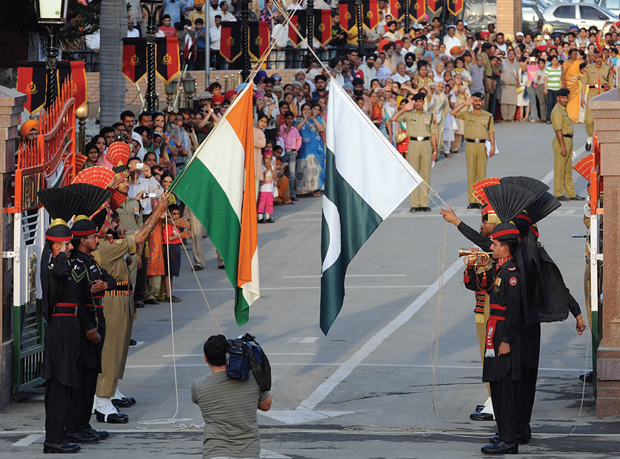
The recently departed late Khushwant Singh ends his epic “Train to Pakistan,” based on the partition travails, on a positive note, where the main protagonist fights against all odds to ensure a safe and secure passage for his love interest and hundreds of her fellow passengers but symbolically loses his life in the wake. Fast forward to the present time, the proverbial train (read travel) back and forth across the border still seeks sacrifices, a travel arrangement that must kick start at least months in advance, extensive documentation, moving across bureaucratic hassles, seeking permissions and still not be sure if one can finally make it or not.
Khushwant’s novel is part of the earlier generation of partition literature, which is replete with stories of divided families, loss of identity and longing, later to be replaced by an increasingly nationalized narrative yet carrying in it strong under currents of the times lost. Likewise, in real time, the generation that experienced the partition, lived through its horrors, faced the fracturing of families is gradually being replaced by a generation of purely Pakistanis or Indians (rather South Asians in general) who have not personally been baptized by this deadly communal fire but carry the legacy of their predecessors and are being ably coopted into the “national identity building” processes. The process has both a positive and negative consequence. Where it is supposedly leaving back the partition legacy behind, it is also giving birth to a mindset, which is strongly shaped by the deeply entrenched memories and experiences of the past. We all conveniently remain wedded to our pasts. A trip to Wahga (border crossing between India and Pakistan, which holds daily flag lowering ceremony) is a witness to these sentiments. Emotional sloganeering, patriotic songs blaring on the music systems, people waving flags, wearing country coded clothes and an emotionally charged environment puts a witness in a very surreal situation. Having always wished to witness the ceremony which is also a huge tourism opportunity, my wish came true in the oddest of circumstances.
The process started as early as November last year, when an invitation was forwarded for a Delhi based event scheduled for March 2014. Being veterans in holding cross border events, after umpteenth exchange of emails entailing required info, our hosts were successful in getting us no objection certificates one each from the Indian home ministry as well as the external affairs. At the visitors’ end it was a very careful and meticulous filling of an online visa form, which Must not go wrong, as it may mean visa refusal or problems at immigration. Interestingly, even opening, filling and saving the form is a process in itself, because many a times, owing to technical issues (or conspiracy ridden mindsets: anonymous forces at work) not every computer is “visa form friendly.” (a successful applicant duly earns the right to celebrate). As if this stress inducing exercise was not enough, courtesy Dr. Shakeel Afridi and his infamous polio campaign debacle, Pakistanis have now to acquire an additional documentation, which certifies that they are not polio carriers. Armed with permissions, certifications and above all invitation letter and hosts’ passport and personal details, I prepared myself for a trip to the Indian High commission, where interestingly intelligence personnel actually guide applicants to the relevant counters. However, I was timely informed that now all visa applications are routed through a courier service, so I applied accordingly. Nearly ten days later, a telephonic call seeking visa interview brought me to the high commission, where after an audience with the consular staff, I had a very friendly audience with an anonymous intel officer who fulfilled his duty very decently and off I went to pursue the governmental permission which would allow me cross border travel, and at that point of time was moving across various governmental offices enroute its final signature. Many thrilling episodes later, I headed to the airport to board a red eye flight to Dubai which would then after few hours’ transit take me to Delhi. Point to note is that there is no direct flight between the two capital cities, and ordinarily we have to take a flight from Lahore or Karachi to Delhi which has a flight time spanning between 45 to 90 minutes respectively.
Feeling very confident that for once everything was in order, and nothing could go wrong, first the airline counter and then immigration informed me that the visa status of Attari/ Delhi meant I could only travel through the Wahga check point via on-foot or the friendship bus service!!! Any amount of persuasion at 2 in the morning could not deter the misinformed officials so I returned home after cancelling my ticket. The next morning a series of phone calls later to all concerned soon found me speeding to Lahore with a driver who could set new records in formula one racing to reach the border before it closes around 1600 hrs for the famous flag hoisting ceremony. To add to the adventure, a quick phone call to a Pakistani military officer stationed at Wahga revealed that Pakistani side of the border closes a 1530 hrs and 1600 is the corresponding Delhi time. With 15 minutes left to the timeline, and still at a distance, it was nothing short of Bollywood movie that eventually had me dashing across the border, but at the end, thanks to the officials at Pakistani end and then their Indian counterparts, I finally made it. Later sharing the story with my hosts and the conference participants, we all not only enjoyed but many walked up to me to share how their parents or grandparents’ generation had crossed the partition in challenging circumstances and how the sense of longing and loss prevailed. Interestingly, each time the official networks become more challenging it is the human factor that kicks in and helps bridge the divides.
***
Image: Arif Ali-AFP, Getty